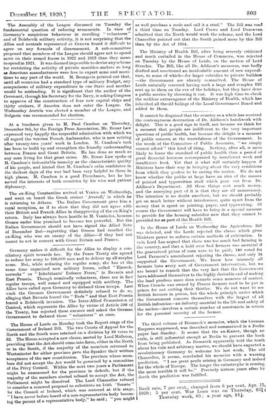The Assembly of the League discussed on Tuesday the fundamental
question of reducing armaments. In view of Germany's suspicious behaviour in enrolling " volunteers" and of Bolshevik military activity, it is not surprising that the Allies and neutrals represented at Geneva found it difficult to agree on any formula of disarmament. A sub-committee proposed that members of the League should agree not to spend more on their armed forces in 1922 and 1923 than they mean to spend in 1921. It was deemed impossible to devise any scheme for restricting the activity of private munition-makers so long as American manufacturers were free to export arms and muni- tions to any part of the world. M. Bourgeois pointed out that, until all countries had a standard type of military Budget, any comparisons of military expenditure in one State and another would be misleading. It is significant that the author of the Covenant, through his Secretary for the Navy, is asking Congress to approve of the construction of four new capital ships and thirty cruisers, if America does not enter the League. On Wednesday Austria was elected a member of the League, and Bulgaria was recommended for election.






































 Previous page
Previous page